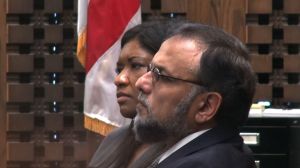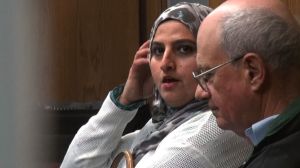HUNTSVILLE, Ala. (WHNT) – The jury was not able to reach a unanimous verdict in the trial of Dr. Iqbal Memon. The judge declared a mistrial just after 4:15 p.m. Thursday, April 10.
Memon was charged with hindering prosecution.
The deadlock came late Thursday afternoon, following two days of jury deliberation.
Dr. Iqbal Memon is on trial for charges of hindering prosecution, for allegedly helping his son Hammad Memon try to escape the country before standing trial for murder
Judge Pate has rescheduled the trial for September 8 at 9 a.m.
Deliberations
The jury, comprised of nine women and three men, deliberated for two full days and debated the evidence of the case. They were deadlocked in the end, however.
Earlier in the day, around 11:30 a.m. jurors re-entered the courtroom, and Circuit Judge Donna Pate addressed them. They were deadlocked at that point — the jury foreman confirmed they had not been able to reach a unanimous verdict. Judge Pate thanked them for their thoughtful discussion so far and urged them to keep going. She said if they could not reach a verdict, she would have to declare a mistrial. This type of instruction, to keep going with deliberations is often referred to as the “dynamite” charge or “Allen charge.”
Judge Pate said they have invested a lot of time into making a decision already, and urged jurors to continue discussions and only base their opinions on evidence presented in the case.
Previous Testimony
Tuesday’s testimony included heated exchanges between the defendant and prosecutors, as well as testimony from Dr. Memon’s wife, Safia.
Dr. Iqbal Memon is on trial for charges of hindering prosecution, for allegedly helping his son Hammad Memon try to escape the country before standing trial for murder. In Day 1, the defense tried to pin the guilt on Safia Memon.
The case is taking place in Circuit Judge Donna Pate’s courtroom.
Both Iqbal and Safia Memon took the stand Tuesday, as well as Madison Police.

The state called Detective Stephen Reeves of the Madison Police Department. He testified about finding passports in the Memon home, in priority envelopes addressed to Hammad Memon. He also found BB&T bank transfer paperwork in plain view in the home’s master bedroom.
Prosecutor Melvin Lockett, with the Madison County District Attorney’s office, questioned Detective Reeves.
“You informed Dr. Memon that his wife and son had been arrested in Dallas,” Lockett said. “Did he seem surprised?”
“No,” Detective Reeves replied.
Reeves said there was no reference in the police report of inconsistencies or nervousness from Dr. Memon. Nowhere on the sworn statement did it indicate police suspected Dr. Memon of helping his son to flee.
Sergeant Drew Westrope with the Madison Police Department later took the stand.
“Iqbal went on a rant about how his son was only 14 and the system was unfair and he should not be tried as an adult,” Westrope said.
Police traced Safia Memon’s cell phone to Texas.
“He said he did not care about Hammad or Safia but he wanted his youngest daughter back,” Westrope said of Dr. Iqbal Memon’s reaction.
Safia Memon testifies
Defense lawyer Barry Abston called Safia Memon to the stand.

“It was the day when the life of two families were turned upside down,” Safia Memon testified, speaking of her family and Todd Brown’s. Brown was the teen her son Hammad shot in February 2010 at Discovery Middle School.
“I told my husband, why didn’t he die? I wished he had died too,” referring to Hammad.
“He was suffering from severe depression and ADHD and he tried to take his own life twice,” Safia said of Hammad.
Abston then asked Safia Memon about events that took place in January 2012.
“Did you begin to consider taking Hammad out the country?” Abston asked.
“That’s right,” Safia Memon replied.
All appeals for Hammad Memon’s case to remain as juvenile status were denied, and the chance of using mental disease or defect was also thrown out, after he went through testing.
“He was not an adult, he was a child,” Safia Memon said.
Safia testified about how she applied for passports for Hammad and herself.
She also testified about the story she told her husband, Iqbal, of needing to take a trip to Atlanta to buy meat for the family. She explained Zabiha meat has to be slaughtered in a certain way in accordance with Islam beliefs. She said she could get it more cheaply and in larger quantities in Atlanta, where there is a higher immigrant population and the meat is more readily available.
“I was planning to take a flight to Pakistan from Atlanta to take Hammad away and protect my son,” Safia said on the stand.
Safia Memon told the court she respected and was appreciative of the opportunities afforded her by the state of Alabama legal system. Her suspended one year probation as part of guilty plea to hindering prosecution allows her to remain at home and continue to care for her two other sons and 9-year-old daughter.
Defendant takes stand
Dr. Iqbal Memon, a pediatrician with an active practice in Athens, denied the charge during his testimony Tuesday and his wife, Safia Memon, said she didn’t tell her husband of her plan to try to take their son, Hammad to Pakistan.
Memon explained in his pediatric practice he sees the underserved of Limestone county, mostly children. Part of the terms of Memon’s permanent U.S. residency, he explained, is to serve the national interest by providing care to indigent patients.
He took the stand after Tuesday’s lunch break and was asked about his on strained relationship with son, Hammad.
“Do you love Hammad?” Prosecutor Lockett asked Memon.
“He was my first love, he was my child of my first love-making with my wife. You can love someone – but there are rules to follow,” Dr. Memon replied.
Memon said he was not aware and had no suspicion that Safia was attempting to take Hammad out of the country.
“Safia knew I wouldn’t have let that happen — no way,” Memon said.
Memon said he cooperated fully with Madison Police. Memon says he provided Safia’s cell phone number and told investigators AT&T was her cell phone provider. Memon also testified he provided Safia’s credit card information.
He then said he complied with requests on Friday, April 13 when asked to call his wife while officers listened on.
Memon had already become frustrated telling prosecutor Lockett, “You got it wrong sir,” when things really began to get tense in the courtroom.
Memon became aggravated and raised his voice when asked by Melvin Lockett if he thought the 25-to 30-year sentence his son faced in April 2012 was too much.
“Yes, I thought it was too much for him but I did not want him to escape the law, I did not want him to escape prosecution,” Memon replied in a loud tone.
Judge Pate repeatedly asked Dr. Memon to simply answer the questions being asked of him. It was when Lockett continued with a line of questioning about everything that happened in his household requiring his counsel, permission and blessing.
“You are just sarcastic sir,” Memon told Lockett to which Judge Pate interjected saying it was time for a 10-minute recess.
She asked defense attorney Barry Abston to “address this issue” with Memon before returning.
Pate told Memon if his behavior continued she would hold him in contempt of court.
Closing arguments concluded at 4 p.m. Tuesday.
Prosecutor Lockett asked jurors to arrive at the only just verdict – a verdict of guilty that would give justice to the family of shooting victim Todd Brown.
Defense attorney Barry Abston called the case one filled with “careless police investigation” and rushes to conclusion.
“This is not the Andy Griffith Show with Barney Fife investigating a crime,” Abston glared at jurors. “A man’s life is on the line here.”
